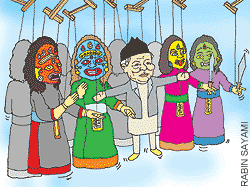 CHAPKAIYAN (Parsa District) - The pond that gives this village outside Birganj its name is in an advanced stage of decay. Water hyacinths have claimed the entire Chapkaiyan Pokhari.
CHAPKAIYAN (Parsa District) - The pond that gives this village outside Birganj its name is in an advanced stage of decay. Water hyacinths have claimed the entire Chapkaiyan Pokhari. Its banks serve as a refuse dump during the day and open-air toilet during the night. People cover their noses as they pass by this huge cesspool on their way to Raxaul. But nobody does anything about it, even during the holy Chhath festival. Come to think of it, even Krishna Prasad Bhattarai ignored Chapkaiyan when he represented this area in the dissolved parliament.

No wonder, then, that very few here seem to be aware of the prolonged illness of their former MP. For the Koeris, Kurmis, Kalwars and Mussalmans of Chhapkaiyan, the games politicians play in the parlours of a faraway capital have little or no meaning. Like the derelict pond, villagers here are resigned to their fate of total neglect.
However, the literate population does seem to realise that the direct rule of the king is now the order of the day. They are guarded in their comments against the new dispensation. A rickshaw-puller echoed the prevailing sentiment, "If we say anything against the government now, they will declare us as Maoists, and we will be made to disappear. Why do you want me to stick my neck out by asking me to say what I feel?" He had a point.
In times like this, the presence of the people's representative may have kept their spirits up. Unfortunately, activists from nearly all mainstream parties have vanished. During Panchayat years, motivators of Nepali Congress and cadres of communist parties would never miss an opportunity like the Chhath festival in the tarai to interact with the public. Not any more.
Commercial interests have taken over the community space vacated by political parties. Trappings of a burgeoning consumer culture are everywhere, even during Chhath. At Ghariharwa Pokhari, where the rich and famous of Birganj gathered to offer prayers to the setting sun on Sunday, banners promoting masalas, noodles and ice-creams hang right above the heads of fasting devotees. Makes you wonder if there is a link between this and the deterioration of political morals in this country.
"Parties in democratic politics," says Anthony Downs, "are analogous to entrepreneurs in a profit-seeking economy. So as to attain their profit ends, they formulate whatever politics they believe will gain most votes, just as entrepreneurs produce whatever products they believe will gain most profits for the same reasons." Unlike in the 'minimalist state' description of political parties, morality has no place in the market mechanism approach to politics.
Politicians of this school do not attach any importance to political parties. For them a political party is an instrument of acquiring power. Lacking the anchor of an established institution, political entrepreneurs are prone to manipulations by vested interests. Quite often, leaders with ambitions who dump them once their utility is over exploit their entrepreneurial skills. But these enterprising people seldom give up, like their compatriots in the world of business, they move on to newer adventures.
These are the kind of individuals that help establish political parties, make them grow, and then end up being the cause of their disintegration. The dynamic roles of Rishikesh Shaha, Tulsi Giri and Bishwa Bandhu Thapa post-1960 are similar to the fissiparous roles played by Sher Bahadur Deuba, Pradip Giri and Bimalendra Nidhi in the re-enactment 42 years later on 4 October.
If Comrade Madhav Nepal has so far refused to be a latter-day Keshar Jung Rayamajhi, the credit goes to the cadres of Nepal Communist Party (UML) who have kept their General Secretary under close watch. Perhaps it also shows that there are more invisible hands in national politics than in the 1960s.
Entrepreneurial politicians use political parties at their convenience, change them when necessary, and have no qualms about discarding them when such institutions prevent them from taking off at will. Whether they are rightists like Badri Narayan Basnet and Kuber Sharma, or self-professed leftists like Devi Ojha and Kamal Chaulagain, political entrepreneurs find commitment to an established ideological institution extremely cumbersome.
The faster and higher they fly, the swifter is their downfall. The remedy may lie in bringing morality back to the political market system. In order to do that, mainstream political parties have no option other than to transform themselves into corporations with clearly defined goals and reaching out to the consumers with renewed vigour. Only then may they succeed in driving out unscrupulous political operators through free and fair competition in the market place of ideas.
Until then, we have to put up with the oddity of "independent" leftists (like a Buddhist without faith in the Sangha) and failed rightists masquerading as "clean and competent" political players. Politically conscious citizens here who once voted for Krishna Prasad Bhattarai are asking why their representative doesn't break his vow of silence despite the resurgence of the right.
Chhath by the Chapkaiyan Pokhari is a fitting metaphor for contemporary Nepali politics. On the first day of the Maoist bandh, we pray on the east bank in the fond hope that someone someday will rescue the pond from the killer weed so that we will be able to breathe easy once again. But the ambitious entrepreneurs of the political free-market are unlikely to engage themselves in this altruistic task.
It needs an institutional effort. Even a politician of the stature of Bhattarai needed the Nepali Congress to win a parliamentary seat from Birganj. Time for him to pay his dues to the party.



